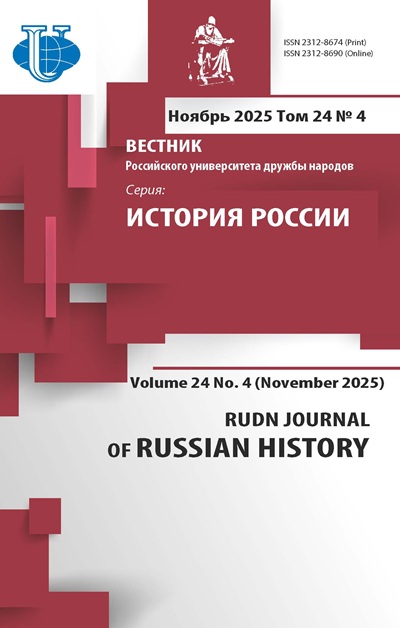«НЕЮБИЛЕЙНАЯ» КНИГА
- Авторы: Зверев В.В.1
-
Учреждения:
- Российская академия народного хозяйства и государственной службы при Президенте РФ
- Выпуск: Том 16, № 2 (2017)
- Страницы: 323-335
- Раздел: РЕВОЛЮЦИЯ В ИСТОРИЧЕСКОЙ ПАМЯТИ
- URL: https://journals.rudn.ru/russian-history/article/view/16662
- DOI: https://doi.org/10.22363/2312-8674-2017-16-2-323-335
- ID: 16662
Цитировать
Полный текст
Аннотация
В статье анализируется монография В.П. Булдакова и Т.Г. Леонтьевой «Война, породившая революцию», которая по своему содержанию и исследовательской направленности разрушает сложившиеся историографические мифы о Великой российской революции. Проведя историко-антропологическую деконструкцию старых и новых представлений, авторы создали многоплановое и многоаспектное исследование проблемы психологии восприятия войны различными слоями российского общества. Авторы рассматривают войну и революцию как острейшее проявление глобальной психопатологии, к которой пришла эпоха Просвещения, закончившаяся мировым катаклизмом. Исследовательские подходы основываются на теории ресентимента (подспудно накапливающейся агрессивности внутри «прогрессирующего» общества).
Об авторах
Василий Васильевич Зверев
Российская академия народного хозяйства и государственной службы при Президенте РФ
Автор, ответственный за переписку.
Email: v.v.zverev@bk.ru
д.и.н., профессор кафедры истории российской государственности; Российская академия государственной службы при Президенте РФ
119606, Россия, Москва, просп. Вернадского, 84Список литературы
- Булдаков В.П., Леонтьева Т.Г. Война, породившая революцию. М.: Новый хронограф, 2015. 720 с.
- Булдаков В.П. Российские смуты и кризисы: востребованность социальной и правовой антропологии // Россия и современный мир. 2001. № 2 (31). С. 31-46.
- Булдаков В.П. Истоки и смысл русской революции: взгляд через 90 лет // Вестник Тверского государственного университета. Серия: История. 2007. № 23 (51). С. 3-17.
- Булдаков В.П. Революция и историческая память: Российские параметры клиотрав-матизма // Россия и современный мир. 2008. № 2 (59). С. 5-27.
- Булдаков В.П. Революция как проблема российской истории // Вопросы философии. 2009. № 1. С. 53-63.
- Булдаков В.П. Октябрьская революция: иное измерение «катастрофичного» прошлого // Вестник Тверского государственного университета. Серия: История. 2009. № 40. Вып. 3. С. 20-35.
- Булдаков В.П. Пир во время чумы? Деморализация российского общества в предреволюционную эпоху: причины и следствия (1914-1916 годы) // Вестник Новосибирского государственного университета. Серия: история, филология. 2014. Т. 13. Вып. 8: История. С. 101-111.
- Булдаков В.П. Феномен российской революции: между мифом и реальностью // Вестник Российского университета дружбы народов. Серия: История России. 2005. № 4. С. 24-33.
- Булдаков В. П. Революция и гражданская война как травма исторической памяти // Вестник Тверского государственного университета. Серия: История. 2007. № 26 (54). С. 98-115.
- Булдаков В.П. Октябрьская революция: современная судьба старых мифов // Русская революция в контексте истории. Томск, 2008. С. 35-43.
- Булдаков В.П. Россия, 1914-1918 гг.: война, эмоции, революция // Россия в годы Первой мировой войны, 1914 - 1918. М., 2014. С. 11-22.
- Леонтьева Т.Г. Вера или свобода? Попы и либералы в глазах крестьян в начале ХХ в. (на материалах Тверской губернии) // Революция и человек: социально-психологический аспект. М., 1996. С. 92-114.
- Леонтьева Т.Г. Вера и бунт: духовенство в революционном обществе России в начале ХХ века // Вопросы истории. 2001. № 1. С. 29-43.
- Леонтьева Т.Г. Вера и прогресс: Православное сельское духовенство России во второй половине XIX - начале ХХ вв. М., 2002. 256 с.
- Леонтьева Т.Г. Православные подданные и большевистская революция: особенности адаптации к «новому миру» в годы Гражданской войны // Гражданская война в России. События, мнения, оценки. М., 2002. С. 495-516.
- Леонтьева Т.Г. Православное духовенство и русская революция // К истории русских революций. События, мнения, оценки. Памяти И. И. Минца. М., 2007. С. 582-603.
- Леонтьева Т.Г. Вера и реформы в России: истоки и причины инновационных провалов // Вестник Тверского государственного университета. Серия «История». 2007. № 23. С. 18-56.
- Леонтьева Т.Г. Православный священник, приход, власть и проблема устойчивости российской государственности // Российская государственность: исторические традиции и вызовы XXI века. М., 2013. С. 693-700.
- Булдаков В.П. Империя и смута: к переосмыслению истории русской революции // Россия и современный мир. 2007. № 3 (56). С. 5-27.
- Булдаков В.П. Историк и миф. Перверсии современного исторического воображения // Вопросы философии. 2013. № 8. С. 54-65.
- Гобсон Дж. Империализм. М., 2009.
- Первая мировая война на почтовых открытках. Книга 1. От Сараева до Компьена. Киров/Вятка, 2014.
- Никонов В.А. Крушение России. 1917. М., 2011.
- Ганелин Р.Ш. Российский революционный процесс и его историографические судьбы // Межвузовская научная конференция «Русская революция 1917 года: проблемы истории и историографии».
- Островский А.В. О степени социального расслоения в дореволюционной России // Межвузовская научная конференция «Русская революция 1917 года: проблемы истории и историографии». Сб. докладов. СПб., 2012. С. 138-146.
- Айрапетов О.Р. Генералы, либералы и предприниматели: работа на фронт и на революцию. 1907-1917. М., 2003.
Дополнительные файлы















